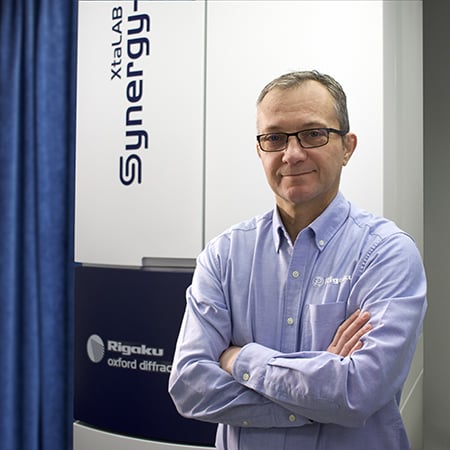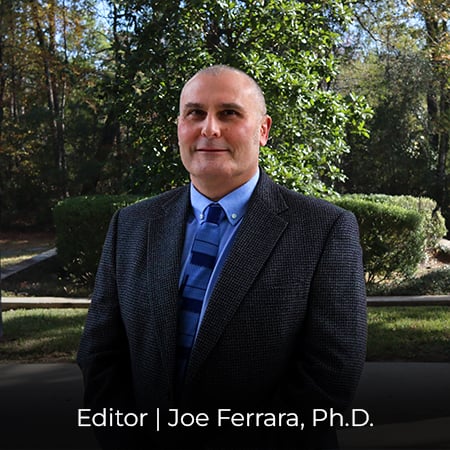Crystallographic analysis of metal-organic frameworks (MOFs), where metal clusters connect organic ligands into network solids with significant voids, is key to understanding their structures and how these influence a variety of functional modalities. These efforts are hindered by the fact that MOFs are often formulated as micron- and nano-sized powders which are unsuitable for conventional single crystal X-ray diffraction, and even large crystals can exhibit fragility in response to external stimuli such as temperature, pressure, and removal from their internal porosity. So how do we probe in situ structural changes in this important class of materials?
On these size scales, electron diffraction is the only option, as MOF chemists (and crystallographers) do not have to worry about particle size limitations or sample fragility: if my micron-sized crystal fractures in half upon solvent removal, then structure determination by electron diffraction is still very much feasible.
In this presentation, I will discuss our application of electron diffraction to the study of MOFs, showing that careful control of analysis conditions can allow characterization of both solvated and empty MOF nanoparticles. Electron diffraction can pinpoint the location of guest molecules bound within the MOF pores, and I will describe the advantages of this approach inherent to working with smaller particles. I will also detail our analysis of structural flexibility upon application of temperature, showing how the unique conditions within the electron diffractometer allow characterization of transient intermediate states not observable elsewhere, and relate these results to macroscale physical phenomena such as gas adsorption behaviors.
Resources
:
- J. Am .Chem. Soc. 2008, 130, 13850
https://doi.org/10.1021/ja8057953 - Chem. Sci. 2020, 11, 4546–4562
https://doi.org/10.1039/D0SC01356K - JACS 2015, 137, 9527
https://doi.org/10.1021/jacs.5b05434 - ACS Appl. Mater. Interfaces 2024, 16, 17812
https://doi.org/10.1021/acsami.4c00604 - Mater. Today Chem. 2022, 24, 100887
https://doi.org/10.1016/j.mtchem.2022.100887 - Chem. Sci. 2023, 14, 7716
https://doi.org/10.1039/D3SC00904A - J. Phys. Chem. Lett. 2024, 15, 5549
https://doi.org/10.1021/acs.jpclett.4c00706 - ChemRxiv 2025,
http://doi.org/10.26434/chemrxiv-2025-tzdml
About the presenter
.jpg)
University of Glasgow | Glasgow, UK
Prof Ross Forgan is Professor of Supramolecular and Materials Chemistry at the University of Glasgow. His research into the application of metal-organic frameworks in biomimetic catalysis and nanoscale drug delivery is underpinned by fundamental studies into molecular recognition and self-assembly processes inside nanoporous materials.
He graduated with a PhD in supramolecular inorganic chemistry, under the supervision of Prof Peter Tasker, from the University of Edinburgh in 2008. A three year postdoctoral position (2008-2011) with Nobel Laureate Prof Sir J Fraser Stoddart at Northwestern University, USA, saw him research organic interlocked molecules, chemical topology and metal-organic frameworks (MOFs). He returned to Scotland in 2011 as a senior research fellow in Prof Lee Cronin’s group at the University of Glasgow, investigating hybrid materials and applications of 3D-printing. After 11 months, he was awarded a Royal Society University Research Fellowship (2012-2021) to begin his independent academic career, with subsequent promotions to Reader in 2016 and Professor in 2019.
To date Forgan has published 97 papers and 2 patents, and has given many invited seminars and lectures at conferences and universities around the world. In 2016 he won a highly prestigious ERC Starting Grant, while he was awarded the Sessler Early Career Researcher Prize in 2018, the RSC Bob Hay Lectureship in 2020, and the RSC Peter Day Memorial Prize in 2024. He is also a Fellow of the Royal Society of Edinburgh and a Fellow of the Royal Society of Chemistry, where he is President of its Porous Materials Interest Group. He is Director of the EPSRC Centre for Doctoral Training in Diversity Led, Mission-Driven Research. He also currently teaches the Chemistry 1 Transition Metals lecture course - click here for additional materials - and the final year i4 Applied Coordination Chemistry course. He is the Head of the Functional Molecules and Assemblies Research Grouping and the School of Chemistry Impact Champion. Want to learn more? Connect with Prof. Ross Forgan LinkedIn .

Contact Us
Whether you're interested in getting a quote, want a demo, need technical support, or simply have a question, we're here to help.

Subscribe to the Crystallography Times newsletter
Stay up to date with single crystal analysis news and upcoming events, learn about researchers in the field, new techniques and products, and explore helpful tips.


